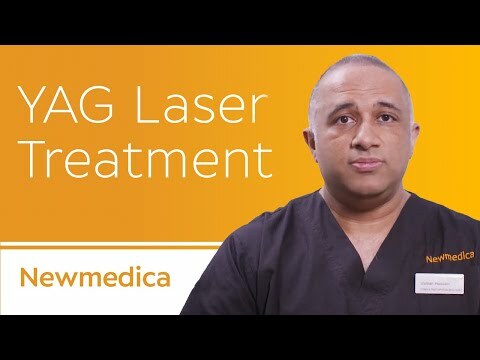They all spoke to me calmly and explained what would be happening. They were amazing.
Sarah’s story

We use YAG laser treatment as a method of treating cloudiness after cataract surgery and some cases of glaucoma. These treatments are known as YAG laser capsulotomy (for cataracts) and YAG peripheral iridotomy (for glaucoma).
Cataract surgery involves removing the cloudy lens caused by cataracts and replacing it with an artificial high-quality lens to improve your vision. The lens sits on a membrane known as the lens capsule. Sometimes, people can develop haze in this lens capsule after their surgery which can make it difficult to see. It might feel like your cataract is coming back or that you’re looking through frosty glass. This is quite a common complication known as posterior capsular opacification (PCO) and can be treated with this quick procedure.
YAG laser capsulotomy involves using a laser to create a tiny opening in the middle of the cloudy capsule behind the lens implant. This helps light to pass through to the retina at the back of your eye, which restores your clear vision.
Learn more about YAG laser capsulotomy treatment with Usman Hussain, consultant ophthalmologist and partner at Newmedica Ipswich and our eye clinic in Bury St Edmunds.

The most obvious benefit of having a YAG laser capsulotomy is that it will make your vision clearer again. Plus, you won’t ever need to have this procedure again as one YAG laser treatment is usually all it takes to get back to enjoying your normal vision.
It usually takes a couple of days to fully notice an improvement and recover from the YAG laser capsulotomy. Your consultant might prescribe you some eye drops to use for a few days after your treatment. A member of the team will explain everything you need to know about how and when to use them.
Complications from a YAG laser capsulotomy are very uncommon, but the chances of any problems developing tends to depend on the overall health of your eye, as well as other factors like your general health. Your consultant will explain any potential issues in greater detail before your treatment.
Laser peripheral iridotomy is used to treat or prevent a specific type of glaucoma or narrow angle glaucoma. This type of glaucoma can cause a sudden build-up of pressure in the eye which could affect your sight.
With this treatment, your consultant uses a laser to create a tiny opening in the outer part of iris (the coloured part of the eye) to allow the fluid to move more freely within the eye – lowering the pressure and helping to protect your eyesight. Our trained optometrists may also carry out this type of laser and it’s very safe.
Acute angle-closure glaucoma develops when the fluid inside your eye can’t drain properly or gets blocked on its way out, causing the pressure inside the eye to rapidly rise. So if you have this type of glaucoma, or are at risk of it, your consultant will recommend this treatment as soon as possible to prevent any permanent changes to your vision.
The overall benefit of YAG laser peripheral iridotomy is to protect your eyes from any risk of high pressure and lasting changes to your eyesight.
There isn’t really a recovery period with this type of treatment – you’ll be able to carry on with all your normal activities straight away (except driving if your vision is still blurred).
Complications are uncommon, but there is a risk of a rise in pressure and inflammation in the eye just after treatment. That’s why your consultant might want to check your eye pressure again before you go home. They’ll go through all of this with you in detail to make sure you’re comfortable before you go ahead with the treatment.
Your optician or GP will discuss the various treatment options available to you and where you can choose to have your treatment. You’ll be able to take the time to decide where you’d like to be treated, and your GP or optician will make the arrangements for your referral to Newmedica.
If you’d prefer to go the private route, you can get in touch with us directly. If you have private medical insurance, they might want some more information before you make your claim. You can find all the details on our private referral page.
Park House, Woodland Park, Bradford Road, Cleckheaton, West Yorkshire, BD19 6BW
Building 720, Waterside Drive, Aztec West, Almondsbury, Bristol, BS32 4UD
The Medical Eye Clinic, Sigford Road, Matford Park, Exeter, EX2 8NL
Newmedica Guernsey, Specsavers Optical Group, La Villiaze Road, St Andrew, Guernsey, GY6 8YP
Buckland House, Langley Business Park, 10 Waterside Drive, Langley, Slough, Berkshire, SL3 6EZ
3 Falcon Gate, Shire Park, Welwyn Garden City, Hertfordshire, AL7 1TW
If you think you have an eye condition, you should see your optician or GP for a detailed assessment. They’ll go through all the options available and tell you where you can have your treatment.
The referral process will differ slightly depending on whether you want to be an NHS or private patient. You’ll find all the information you need on our NHS and private patient pages.
Are you a health care professional?
Find out how to refer a patient.
Find details about our private
options and how to get started.
Self-referring? Call 0800 4096 792


